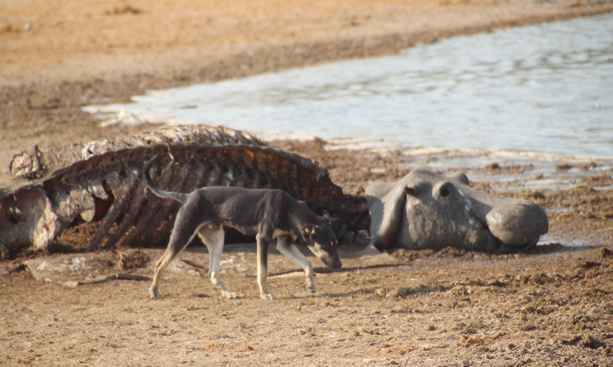Over 200 hippos have been left stranded at Nxaraga hippo pool, despite ongoing efforts by the Department of Wildlife and National Parks to drill boreholes to refill the pools.
The lingering drought and the drying up of rivers in Ngamiland is driving hippos and crocodiles into new areas in search of water while many others have been decimated. The drought has also pushed wildlife from their habitats into human settlements, increasing the risk of conflict. Nxaraga communities have raised alarm about the deterioratimng state where carcasses of dead animals are lying all over the place. Residents complain that efforts by DWNP are too little too late as large numbers of hippos are left without water.
Umbrella for Democratic Councillor (UDC) for Nxaraga, Morolong Mosimanyana complained that what is being done is not enough to protect the species. Mosimanyana said recently during a clean-up campaig by different government departments to address the ongoing drought situation they removed nine (9) carcasses of hippos suspected to have been killed during territorial fights due to competition for water resources. He also revealed that just two days ago two hippos were found dead. “There are lots of territorial fights that are going on around the area and this is not good at all something needs to be done. Hippos are hardly grazing due to the diminishing pastures and are forced to travel long distances to look for shrubs to feed on,” said Mosimanyana, adding that most of the animals have become too weak to walk long distance and therefore remain in one place.
“They will slowly die if something urgent is not done. We are going to lose a lot of wildlife because the drought is far from over,” he warned.
Mosimanyana complained that the department of wildlife is not doing enough, suggesting that they should atleast feed the hippos to save them before the rainy season because the pastures have dwindled. He accused President Mokgweetsi Masisi’s administration of lack of commitment to wildlife conservation and management as they have abandoned the stranded animals. species and have let the nature to take its course. For his part, the regional Wildlife Officer also confirmed that they have been clearing carcasses dried river steams. Dr Nkgoe said they have discovered more than ten hippo carcasses. He however attributed their death to territorial fight rather than drought because there is still some water in the pools.
He also acknowledged that if his department did not act promptly they would have lost many animals, explaining that they use boreholes to refill Nxaraga pools to save the population.
Asked what they are doing about dimishing pastures, Nkgoe said they give priority to wildlife in the protected areas rather than those in human settlements such as Nxaraga. He further revealed that they recently collaborated with tourism operators like Great Plains and Rob Jackson to relocate eight hippos from around Maun into the Okavango Delta where there is plenty of water.
Dr Nkgoe explained that currently they are in a process of habituation as they have confined hippos for weeks until they get strong enough and settled before they can be moved to the Delta. He also highlighted that the capture teams have arrived in Maun to seize all the hippos and crocodiles in pools within Maun to save them from endangering the lives of residents and compete for the limited water resources with the populace. He added that signs posts have put across Maun near water bodies alerting people of the dangers of swimming in these water bodies. There is also plans in place to address schools and Maun of the danger of using these water bodies with the concentration of these animals.
